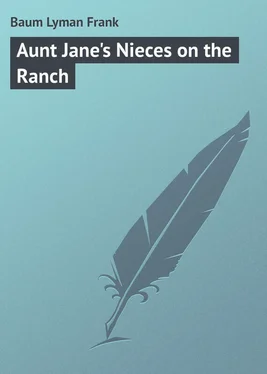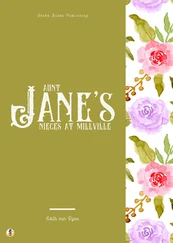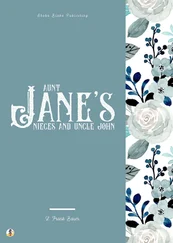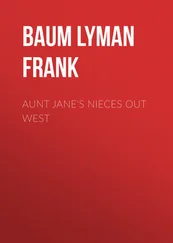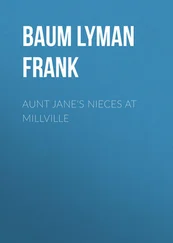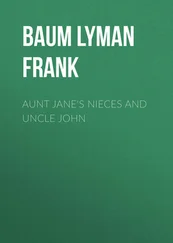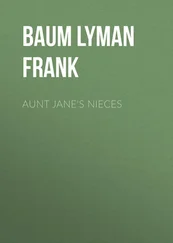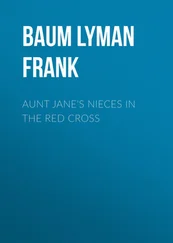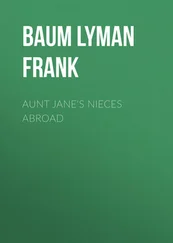Lyman Baum - Aunt Jane's Nieces on the Ranch
Здесь есть возможность читать онлайн «Lyman Baum - Aunt Jane's Nieces on the Ranch» — ознакомительный отрывок электронной книги совершенно бесплатно, а после прочтения отрывка купить полную версию. В некоторых случаях можно слушать аудио, скачать через торрент в формате fb2 и присутствует краткое содержание. Издательство: Иностранный паблик, Жанр: Классический детектив, foreign_detective, foreign_prose, на английском языке. Описание произведения, (предисловие) а так же отзывы посетителей доступны на портале библиотеки ЛибКат.
- Название:Aunt Jane's Nieces on the Ranch
- Автор:
- Издательство:Иностранный паблик
- Жанр:
- Год:неизвестен
- ISBN:нет данных
- Рейтинг книги:4 / 5. Голосов: 1
-
Избранное:Добавить в избранное
- Отзывы:
-
Ваша оценка:
- 80
- 1
- 2
- 3
- 4
- 5
Aunt Jane's Nieces on the Ranch: краткое содержание, описание и аннотация
Предлагаем к чтению аннотацию, описание, краткое содержание или предисловие (зависит от того, что написал сам автор книги «Aunt Jane's Nieces on the Ranch»). Если вы не нашли необходимую информацию о книге — напишите в комментариях, мы постараемся отыскать её.
Aunt Jane's Nieces on the Ranch — читать онлайн ознакомительный отрывок
Ниже представлен текст книги, разбитый по страницам. Система сохранения места последней прочитанной страницы, позволяет с удобством читать онлайн бесплатно книгу «Aunt Jane's Nieces on the Ranch», без необходимости каждый раз заново искать на чём Вы остановились. Поставьте закладку, и сможете в любой момент перейти на страницу, на которой закончили чтение.
Интервал:
Закладка:
Of course the new arrivals were eager to inspect the orange and olive groves, so on the day following that of their arrival the entire party prepared to join Arthur Weldon in a tramp over the three hundred acre ranch.
A little way back of the grounds devoted to the residence and gardens began the orange groves, the dark green foliage just now hung thick with fruit, some green, some pale yellow and others of that deep orange hue which denotes full maturity. “They consider five acres of oranges a pretty fair ranch, out here,” said the young proprietor; “but I have a hundred and ten acres of bearing trees. It will take a good many freight cars to carry my oranges to the eastern markets.”
“And what a job to pick them all!” exclaimed Patsy.
“We don’t pick them,” said Arthur. “I sell the crop on the trees and the purchaser sends a crew of men who gather the fruit in quick order. They are taken to big warehouses and sorted into sizes, wrapped and packed and loaded onto cars. That is a separate branch of the business with which we growers have nothing to do.”
Between the orange and the olive groves, and facing a little lane, they came upon a group of adobe huts – a little village in itself. Many children were playing about the yards, while several stalwart Mexicans lounged in the shade quietly smoking their eternal cigarettes. Women appeared in the doorways, shading their eyes with their hands as they curiously examined the approaching strangers.
Only one man, a small, wiry fellow with plump brown cheeks and hair and beard of snowy whiteness, detached himself from the group and advanced to meet his master. Removing his wide sombrero he made a sweeping bow, a gesture so comical that Patsy nearly laughed aloud.
“This is Miguel Zaloa, the ranchero, who has charge of all my men,” said Arthur. Then, addressing the man, he asked: “Any news, Miguel?”
“Ever’thing all right, Meest Weld,” replied the ranchero, his bright eyes earnestly fixed upon his employer’s face. “Some pardon, señor; but – Mees Jane is well?”
“Quite well, thank you, Miguel.”
“Mees Jane,” said the man, shyly twirling his hat in his hands as he cast an upward glance at the young ladies, “ees cherub young lade; much love an’ beaut’ful. Ees not?”
“She’s a dear,” replied Patsy, with ready sympathy for the sentiment and greatly pleased to find the man so ardent an admirer of the baby.
“Ever’bod’ love Mees Jane,” continued old Miguel, simply. “Since she have came, sun ees more bright, air ees more good, tamale ees more sweet. Will Inez bring Mees Jane to see us to-day, Meest Weld?”
“Perhaps so,” laughed Arthur; and then, as he turned to lead them to the olive trees, Louise, blushing prettily at the praise bestowed upon her darling, pressed a piece of shining silver into old Miguel’s hand – which he grasped with alacrity and another low bow.
“No doubt he’s right about little Jane,” remarked the major, when they had passed beyond earshot, “but I’ve a faint suspicion the old bandit praised her in order to get the money.”
“Oh, no!” cried Louise; “he’s really sincere. It is quite wonderful how completely all our Mexicans are wrapped up in baby. If Inez doesn’t wheel the baby-cab over to the quarters every day, they come to the house in droves to inquire if ‘Mees Jane’ is well. Their love for her is almost pathetic.”
“Don’t the fellows ever work?” inquired Uncle John.
“Yes, indeed,” said Arthur. “Have you any fault to find with the condition of this ranch? As compared with many others it is a model of perfection. At daybreak the mules are cultivating the earth around the trees; when the sun gets low the irrigating begins. We keep the harrows and the pumps busy every day. But during the hours when the sun shines brightest the Mexicans do not love to work, and it is policy – so long as they accomplish their tasks – to allow them to choose their own hours for labor.”
“They seem a shiftless lot,” said the major.
“They’re as good as their average type. But some – old Miguel, for instance – are better than the ordinary. Miguel is really a clever and industrious fellow. He has lived here practically all his life and knows intimately every tree on the place.”
“Did he serve the old Spanish don – Cristoval?” asked Beth.
“Yes; and his father before him. I’ve often wondered how old Miguel is. According to his own story he must be nearly a hundred; but that’s absurd. Anyhow, he’s a faithful, capable fellow, and rules the others with the rigor of an autocrat. I don’t know what I should do without him.”
“You seem to have purchased a lot of things with this ranch,” observed Uncle John. “A capital old mansion, a band of trained servants, and – a ghost.”
“Oh, yes!” exclaimed Louise. “Major, did the ghost bother you last night?”
“Not to my knowledge,” said the old soldier. “I was too tired to keep awake, you know; therefore his ghostship could not have disturbed me without being unusually energetic.”
“Have you ever seen the ghost, Louise?” inquired Patsy.
“No, dear, nor even heard it. But Arthur has. It’s in the blue room, you know, near Arthur’s study – one of the prettiest rooms in the house.”
“That’s why we gave it to the major,” added Arthur. “Once or twice, when I’ve been sitting in the study, at about midnight, reading and smoking my pipe, I’ve heard some queer noises coming from the blue room; but I attribute them to rats. These old houses are full of the pests and we can’t manage to get rid of them.”
“I imagine the walls are not all solid,” explained Louise, “for some of those on the outside are from six to eight feet in thickness, and it would be folly to make them of solid adobe.”
“As for that, adobe costs nothing,” said Arthur, “and it would be far cheaper to make a solid wall than a hollow one. But between the blocks are a lot of spaces favored as residences by our enemies the rats, and there they are safe from our reach.”
“But the ghost?” demanded Patsy.
“Oh, the ghost exists merely in the minds of the simple Mexicans, over there at the quarters. Most of them were here when that rascally old Cristoval died, and no money would hire one of them to sleep in the house. You see, they feared and hated the old fellow, who doubtless treated them cruelly. That is why we had to get our house servants from a distance, and even then we had some difficulty in quieting their fears when they heard the ghost tales. Little Inez,” added Louise, “is especially superstitious, and I’m sure if she were not so devoted to baby she would have left us weeks ago.”
“Inez told me this morning,” said Beth, “that the major must be a very brave man and possessed some charm that protected him from ghosts, or he would never dare sleep in the blue room.”
“I have a charm,” declared the major, gravely, “and it’s just common sense.”
But now they were among the graceful, broad-spreading olives, at this season barren of fruit but very attractive in their gray-green foliage. Arthur had to explain all about olive culture to the ignorant Easterners and he did this with much satisfaction because he had so recently acquired the knowledge himself.
“I can see,” said Uncle John, “that your ranch is to be a great gamble. In good years, you win; a crop failure will cost you a fortune.”
“True,” admitted the young man; “but an absolute crop failure is unknown in this section. Some years are better than others, but all are good years.”
It was quite a long tramp, but a very pleasant one, and by the time they returned to the house everyone was ready for luncheon, which awaited them in the shady court, beside the splashing fountain. Patsy and Beth demanded the baby, so presently Inez came with little Jane, and Mildred Travers followed after. The two nurses did not seem on very friendly terms, for the Mexican girl glared fiercely at her rival and Mildred returned a basilisk stare that would have confounded anyone less defiant.
Читать дальшеИнтервал:
Закладка:
Похожие книги на «Aunt Jane's Nieces on the Ranch»
Представляем Вашему вниманию похожие книги на «Aunt Jane's Nieces on the Ranch» списком для выбора. Мы отобрали схожую по названию и смыслу литературу в надежде предоставить читателям больше вариантов отыскать новые, интересные, ещё непрочитанные произведения.
Обсуждение, отзывы о книге «Aunt Jane's Nieces on the Ranch» и просто собственные мнения читателей. Оставьте ваши комментарии, напишите, что Вы думаете о произведении, его смысле или главных героях. Укажите что конкретно понравилось, а что нет, и почему Вы так считаете.
